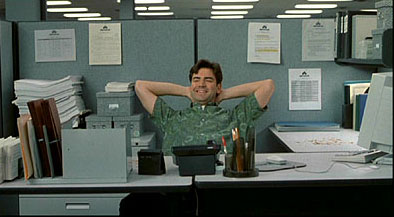I’d like to present to y’all today, a completely cynical view of work and the workplace. It is definitely embraced by some, but I would like to say that I have in fact always believed that truly great leaders take the blame and pass on the credit. I’m just laying out an alternative viewpoint that seems to be somewhat prevalent today and has been parodied ad nauseam in sitcoms and reality shows. As the old saying goes – there’s always a little truth hidden in any joke.
I was watching that old cult classic Office Space the other day on Comedy Central. The movie is a parody of corporate America, in which an anti hero, do nothing, worker drone gets “woke” and takes control of his own destiny through a series of strange coincidences.
Initially drowning in a state of existential angst, Peter Gibbons gets his mind altered by a psychiatrist hypnotist who dies before he is able to snap Peter out of his altered state. Peter and his friends subsequently develop a software virus that robs their company’s customers, transferring millions of fractional pennies to their bank accounts over an extended period of time.
Much hilarity and chaos ensues, but ultimately, Peter and his small gang of co-conspirators win out and never wind up in “Federal pound me in the ass prison”.
Now I could go on and on about what the lesson to humanity is in this movie, but I would instead prefer to expound upon what I learned from this movie.
I learned that there are those in the work place that will gladly accept responsibility for your accomplishments as well as blame you for the failures. I’ve often said that there are always two possible final steps in any project. The first is the “Assigning of blame” step. The second is the “Claiming of credit” step. I’ve experienced both during my long career as an engineer, but the worst experience has been when someone else claims credit for work that I have done. Lemme tell ya – it’s not a nice feeling.
One particular example comes to mind. I worked with one of our customers to develop a software solution to a jet engine inspection problem that they were having. We worked for about six months on the solution and deployed it across the customers business.
Later, while attending a business conference, some yo-yo climbed the stage to give a presentation on the software, whilst implying that he had developed the whole solution. He even used the Power Point presentation that I had created to describe the project. Meanwhile, I sat there with mouth agape whilst listening to this sleazel describe “his accomplishment”. He finished his presentation to a round of wild applause from the audience.
I said all that to say this, with my tongue firmly planted in my cheek – I had the wrong approach to life and instead should have adopted the “Peter Gibbons Philosophy of Life”. What is that you ask? Do Nothing. That’s right – Do Nothing. Do absolutely nothing and realize the joy that can be experienced by the lack of activity. The universe will work the whole thing out for you, so why would you want to interfere? Coincidentally, I have met several people that have adopted this philosophy. It seems to be working out quite well to date, so apparently they are far wiser than I.
I always wondered how and why doing nothing could be so joyful for some. Well, now that I am retired I am realizing that, indeed, the non-act of doing nothing is very joyful. My advice to y’all?
Do nothing, and you can do no wrong. You won’t do any good either, but you can’t be blamed for any of the faults or failures of this world. To quote Peter Gibbons – “Michael, I did nothing. I did absolutely nothing, and it was everything I thought it could be.”
A corollary to this theorem, also attributed to Peter Gibbons is – “It’s not that I’m lazy, it’s that I just don’t care”.

